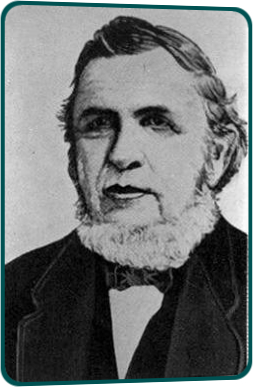Have you ever wondered about Islam in the Bible? Or if Revelation is a literal book, containing literal events? Or how the Seventh-day Adventist Church got started?
This day in history is pivotal to all those questions.
“Dr. Josiah Litch, a 19th Century physician and itinerant minister for the Methodist Episcopal Church, accurately predicted two years in advance, the fall of the Ottoman Empire in August of 1840 (a formidable alliance of Arab nations governed from Turkey). This was an exact fulfillment of Bible prophecy in “Revelation” chapter nine. Continuing his research, two months before the event he predicted the exact day, August 11, 1840, and it was widely circulated in Christian journals and newspapers.” Read Josiah Litch’s Article Here.

“In our world with relatively sovereign boundaries, it is difficult to understand Litch’s article unless you remember society was different in their times–slavery of humans and nations was rampant with subjects “paying tribute to caesar.” Today students are reminded of the Boston Tea Party when the U.S. protested againsttaxation without representation, beginning its rebellion against English subjugation. Turkey was also a superpower called the Ottoman Empire, and like another empire, the massive Soviet Union, it was about to collapse.
In 1838, Turkey suppressed a rebellion by Egypt, who then offered to pay the Turkish sultan tribute of $750,000,000. This was obviously a stalling tactic because Egypt successfully attacked the Turks the next year (1839), captured its naval fleet, and decimating its army. With only three ships left and a greatly weakened army, battles in 1840 would obviously witness the complete destruction of the Ottoman Empire and new dominance by Egyptian extremists, that is, unless God moved upon Christian nations to help the Ottomans. God is great! He controls destinies; and to maintain a balance of power and stability in that region, He intervened to avoid massive battles and the shedding of blood.
England, Russia, Austria and Prussia, four Christians nations with their massive fleets, came to Turkey’s assistance and established ultimatums against Egypt. They reduced the boundaries of Egyptian rule and forced the pasha of Egypt, Mehemet Ali, to return the fleet to the Turkish Sultan.
Note this point: The weakened Ottoman Empire legally admitted that their existence depended upon the support of Christian nations when this ultimatum took effect, as it was hand delivered to the Egyptians by the Turkish envoy on August 11, 1840, in fulfillment of Bible prophecy. The humbled Sultan of the Ottoman Empire saved his reign and probably his life by accepting this protection from those Christian powers. The Turkish Sultan then watched the dismemberment of his weakened Empire as his “protectors” appropriated parts of his dominion to their own use, piece by piece.
It will be observed that armies and politics take time to build and shape; thus, no single event normally marks the exact beginning or end of any military power but in 1840, and today, many believe the obvious prophetic fulfillment on August 11, 1840, marked the fall of the Turkish Ottoman Empire.” quoted from: http://www.revealed.org/josiahlitch.html
However, “after the Great Disappointment, Litch first thought there was some misunderstanding with regard to what happened in 1844. In 1845, he was present at the Albany Conference where the Millerites who were opposed to the shut-door doctrine met to work out the meaning of the Great Disappointment, and determine the future of the movement.
Josiah Litch eventually worked with the Evangelical Adventists, and served as president of the American Millennial Association. He formed his own organization known as the Messianians, and served as president in both Pennsylvania, and Canada.[7]
Josiah Litch slowly abandoned the historicist view of prophecy, in favor of futurism. He attended the Prophetic Conference held at the Church of Holy Trinity, in New York City, Oct. 30–Nov. 1, 1878.[8] Litch died January 31, 1886.